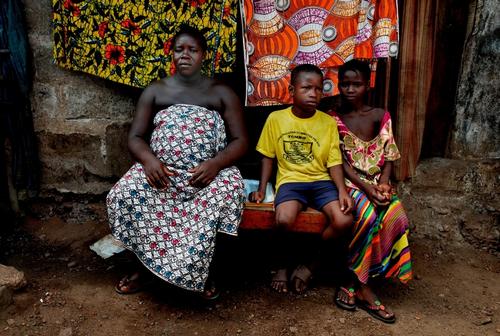The massive Ebola management centres run by Médecins Sans Frontières at the peak of the outbreak are no longer full of patients, but MSF’s teams are still busy, making sure that all traces of Ebola are stamped out within local communities.
The residents of Moa Bay Wharf slum in central Freetown have ocean views from almost every side, but the cramped and chaotic living conditions make the environment anything but idyllic.
As pigs laze nearby, epidemiologist Dr Kieran O’Connor and his outreach team talk to a family which has recently lost two members to Ebola. As primary contacts of Ebola patients, the remaining members of the household are at risk of infection themselves. The team members ask if anyone is experiencing any symptoms, and check for fever using an infrared thermometer.
“We are feeling well, but we are tired of Ebola,” says Ibrahim, whose mother died of the disease. “We are praying to God for this epidemic to come to an end.”
This MSF team is responsible for contact tracing and surveillance in nine areas of Freetown. When a new alert comes through the government’s Ebola hotline, the team pays a visit to the household affected. Their aim is to map out everyone who has had any close contact with a suspected or confirmed Ebola patient, as well as to determine how the patient became infected.
“We try to link up new cases to existing chains of transmission,” says Dr Kieran. “Most of the time now we are able to do that, which is a good sign. We follow each chain carefully to find any contacts who are showing early Ebola symptoms, and we send them to an Ebola management centre for further investigation. This reduces the risk of cross-infection. A chain goes dead when no new contacts develop the disease after 21 days of follow-up. Once this happens the incidence of Ebola drops rapidly.”
Until the very last contact
Health promoter Shekhu Jabbie says contact tracing is not as easy as simply asking for the names of family members. “We ask about their occupation, whether they’re farmers, traders or traditional healers. We interview them about their marriage background, their children, the people they live with, the people they share a latrine with.”
Many of the people living in Moa Bay Wharf are traders at the local market, and come into contact with hundreds of other people on a daily basis. Elsewhere in Freetown’s slum districts, hundreds of people may share the same latrine, dramatically increasing the list of primary contacts. The outreach team asks about any recent travel history, funerals attended or visits to sick relatives or friends. It often takes several visits to build up trust, and at that point previously hidden details may emerge.
“Sometimes people will remember, ‘oh yes, she did visit her sick aunty last week’. At the end of the day the answers that people give us help us determine how they got infected,” says Shekhu.
Other healthcare needs
In addition to checking for Ebola symptoms, the team also looks for anyone with other health conditions and makes referrals for tests and treatment as required. The biosafety risks mean they try to keep two metres away from other poeple, but the crowded environment can make this impractical.
“It’s a challenge to do clinical diagnosis because we have to keep a distance, but we make the best assessment that we can,” says Dr O’Connor.
“We work with other organisations to ensure that contacts get the non-Ebola healthcare they need. There are a lot of downstream effects of this outbreak. We’ve seen people with conditions like HIV and TB left untreated.”
As Ebola cases decline in Sierra Leone, MSF teams will continue to work closely with communities to support people’s health needs.




